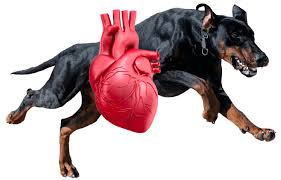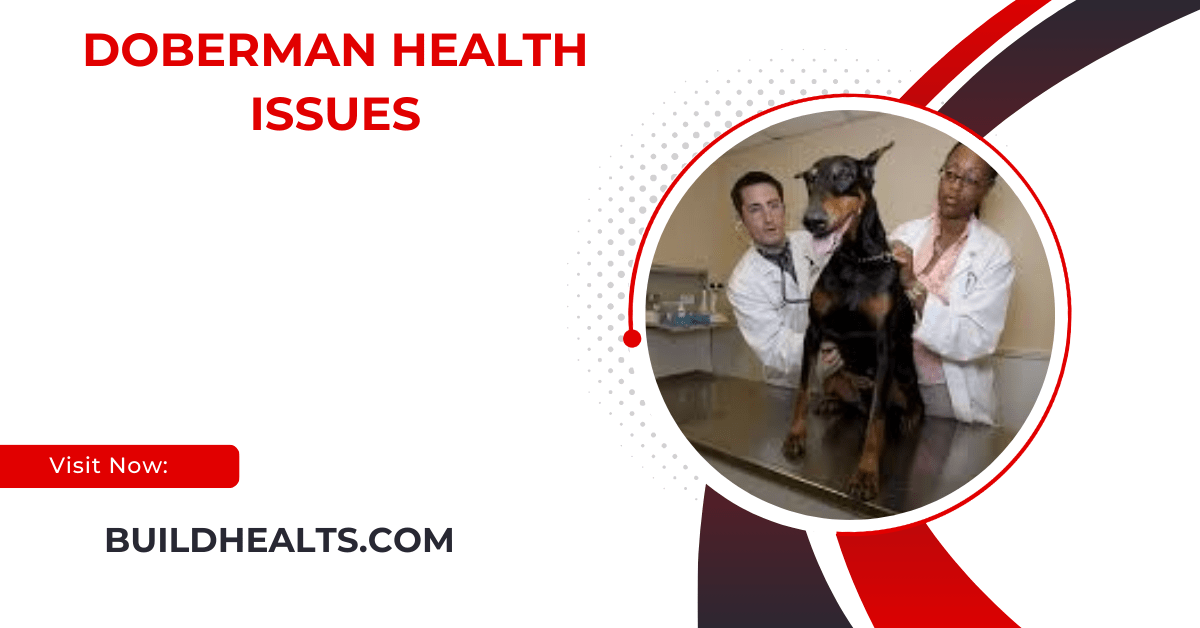Doberman Pinschers are loyal and intelligent dogs prone to health issues like heart disease and hip dysplasia. Regular veterinary care and preventive measures are essential for keeping them healthy.
Doberman Pinschers are known for their loyalty, intelligence, and striking appearance. However, like all breeds, they are prone to specific health issues. Understanding these issues is essential for every Doberman owner.
This guide will cover common health problems, preventive care, and tips for maintaining your Doberman’s health.
Common Health Issues in Dobermans:
1. Dilated Cardiomyopathy (DCM)

Dilated Cardiomyopathy is a serious heart condition common in Dobermans. This disease affects the heart muscle, making it difficult for the heart to pump blood effectively. It is one of the leading causes of death in this breed.
- Symptoms: Symptoms include coughing, difficulty breathing, lethargy, and fainting. Some dogs may exhibit signs of fluid in the abdomen or sudden collapse. If you notice any of these signs, contact your veterinarian immediately for a thorough examination.
- Diagnosis: Your vet may perform an ultrasound or an electrocardiogram (ECG) to diagnose DCM. In some cases, X-rays may be used to assess the heart’s size and the presence of fluid in the lungs.
- Treatment: There is no cure for DCM, but medications can help manage symptoms and improve the quality of life. Common treatments include diuretics to reduce fluid buildup, ACE inhibitors to lower blood pressure, and medications to improve heart contractility.
2. Hip Dysplasia
Hip dysplasia is a genetic condition where the hip joint does not fit properly into the hip socket. This can lead to arthritis and pain, severely affecting the dog’s mobility.
- Symptoms: Signs include difficulty rising, limping, and reluctance to exercise. Some dogs may also exhibit a swaying gait or a decrease in activity level. Early signs might be subtle, so it’s important to monitor your dog’s behavior closely.
- Diagnosis: Your veterinarian will perform physical examinations and may recommend X-rays to confirm the diagnosis. The vet will look for abnormal joint formation and assess the degree of dysplasia.
- Treatment: Treatment options include weight management, pain relief medications, physical therapy, and surgery in severe cases. In some cases, joint supplements containing glucosamine and chondroitin may help support joint health.
Also read: What is Tier 1 Home Health in Arkansas – A Complete Guide!
3. Von Willebrand Disease (vWD)
Von Willebrand Disease is a bleeding disorder common in Dobermans. It affects the blood’s ability to clot properly due to a deficiency of von Willebrand factor, a protein necessary for platelet function.
- Symptoms: Symptoms may include excessive bleeding from minor cuts, nosebleeds, or prolonged bleeding during surgery. Some dogs may also experience bruising or have blood in their urine or stool.
- Diagnosis: A blood test can determine if your Doberman has vWD. This test checks for the levels of von Willebrand factor in the blood.
- Treatment: There is no cure, but treatment focuses on managing bleeding episodes. In some cases, desmopressin may be used to help with clotting. For severe cases, blood transfusions may be necessary.
4. Hypothyroidism
Hypothyroidism occurs when the thyroid gland does not produce enough thyroid hormone. This condition can affect various bodily functions, including metabolism, energy levels, and skin health.
- Symptoms: Signs of hypothyroidism include weight gain, lethargy, and skin problems such as excessive shedding or dull fur. Some dogs may also develop a thickened, flaky skin condition known as myxedema.
- Diagnosis: A blood test can confirm low levels of thyroid hormones. Your veterinarian may recommend a complete thyroid panel to assess your dog’s thyroid function comprehensively.
- Treatment: Hypothyroidism is treated with daily hormone replacement medication. Levothyroxine is the most commonly prescribed medication. Regular check-ups will help monitor hormone levels and adjust medication as needed.
5. Gastric Dilatation-Volvulus (GDV)
GDV, also known as bloat, is a life-threatening condition where the stomach fills with gas and twists. This can cut off blood supply and lead to shock.
- Symptoms: Symptoms include a swollen abdomen, restlessness, attempts to vomit without producing anything, excessive drooling, and signs of discomfort. If you notice these symptoms, seek immediate veterinary care, as GDV can rapidly progress to death.
- Diagnosis: Diagnosis is typically made through a physical exam and X-rays. X-rays will show the characteristic gas-filled stomach and any twisting of the organ.
- Treatment: GDV is a medical emergency. Surgery is often required to untwist the stomach and stabilize the dog. In some cases, veterinarians may also perform a procedure called gastropexy to prevent future episodes.
Preventive Care for Dobermans:

Preventive care is essential for maintaining your Doberman’s health and preventing potential health issues. Here are some key areas to focus on:
Regular Veterinary Check-Ups:
Routine vet visits are essential for early detection and prevention of health issues. Your veterinarian can recommend vaccinations, parasite control, and screenings for common conditions. Schedule annual check-ups to ensure your dog is healthy and to catch any potential problems early.
Healthy Diet:
A balanced diet is crucial for maintaining your Doberman’s health. Ensure that you provide high-quality dog food with the right mix of proteins, fats, and carbohydrates. Consult your vet for dietary recommendations based on your dog’s age, weight, and activity level. Monitor your dog’s weight regularly and adjust food portions as needed to prevent obesity.
Exercise and Mental Stimulation:
Dobermans are active and intelligent dogs that require regular exercise and mental stimulation to stay happy and healthy. Daily walks, playtime, and training sessions are excellent ways to provide physical and mental enrichment. Consider incorporating activities like agility training or obedience classes to keep your Doberman engaged.
Also read: Is Liquid Cotton Bad for Your Health – The Truth You Need to Know!
Weight Management:
Maintaining a healthy weight is vital for your Doberman’s overall health. Obesity can exacerbate many health issues, including hip dysplasia and heart problems. Monitor your dog’s food intake and ensure they get plenty of exercise. Regularly evaluate your dog’s body condition score with your veterinarian to ensure they are at a healthy weight.
Dental Care:
Dental health is often overlooked but is crucial for your Doberman’s overall well-being. Periodontal disease can lead to severe health issues, including heart and kidney problems. Regularly brush your dog’s teeth and consider dental treats or toys to help keep their teeth clean. Schedule professional dental cleanings as recommended by your veterinarian.
Tips for Managing Health Issues:

- Be Proactive: If you notice any changes in your Doberman’s behavior or health, do not hesitate to contact your veterinarian. Early intervention can make a significant difference in managing health issues. Regularly monitor your dog for signs of discomfort, changes in appetite, or behavioral shifts.
- Educate Yourself: Understanding common health problems can help you make informed decisions about your Doberman’s care. Read up on health conditions and talk to your veterinarian about preventive measures. Joining online forums or breed clubs can also provide valuable insights into Doberman health issues.
- Join Support Groups: Connecting with other Doberman owners can provide valuable insights and support. Online forums and local breed clubs often have resources and information on health issues specific to Dobermans. Sharing experiences and advice can help you navigate the challenges of caring for a Doberman.
- Consider Pet Insurance: Pet insurance can help alleviate the financial burden of unexpected veterinary expenses. Research different policies to find one that covers the health issues most common in Dobermans. Having insurance can provide peace of mind and allow you to focus on your dog’s care rather than the costs.
- Regularly Monitor Health: Keep a close eye on your Doberman’s health by maintaining a health journal. Note any changes in behavior, appetite, or activity level. Regularly track their weight and any medications they are taking. This information can be invaluable during vet visits and can help your veterinarian provide the best care.
Also read: Micromedex HealthCare Services Is Recommended When Researching – The Benefits of Micromedex!
FAQ’s
1. What are common health issues in Dobermans?
Common health issues in Dobermans include Dilated Cardiomyopathy, hip dysplasia, Von Willebrand disease, hypothyroidism, and Gastric Dilatation-Volvulus (GDV).
2. How can I prevent health problems in my Doberman?
Prevent health problems by scheduling regular veterinary check-ups, providing a balanced diet, ensuring regular exercise, and maintaining proper dental care.
3. What should I do if my Doberman shows signs of illness?
If your Doberman shows any signs of illness, such as lethargy, difficulty breathing, or unusual behavior, contact your veterinarian immediately for a thorough examination.
4. Is pet insurance recommended for Dobermans?
Yes, pet insurance is recommended as it can help cover unexpected veterinary expenses related to common health issues in Dobermans.
5. How can I manage my Doberman’s weight?
Manage your Doberman’s weight by monitoring food intake, providing regular exercise, and consulting your veterinarian for dietary recommendations based on their age and activity level.
Conclusion
In conclusion, Doberman Pinschers are prone to several health issues, including Dilated Cardiomyopathy, hip dysplasia, and Von Willebrand disease. Preventive care, such as regular veterinary check-ups, a balanced diet, and consistent exercise, is essential for maintaining their health. By staying informed and proactive, owners can significantly improve their Doberman’s quality of life and longevity.




